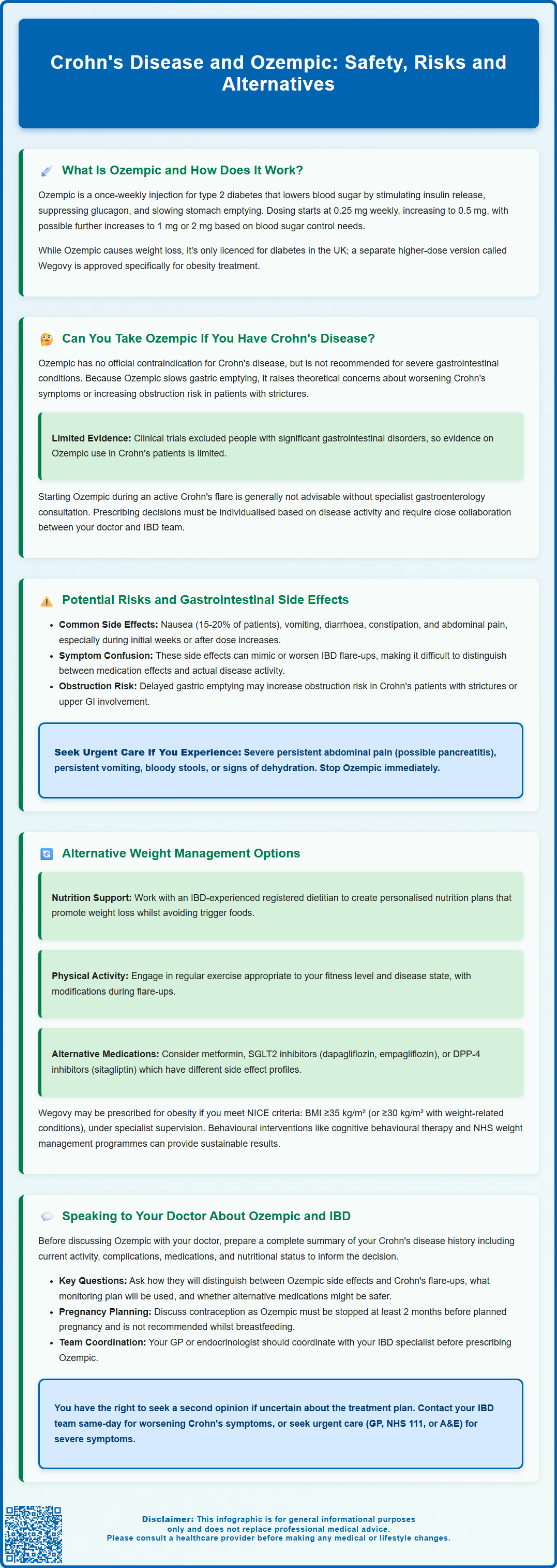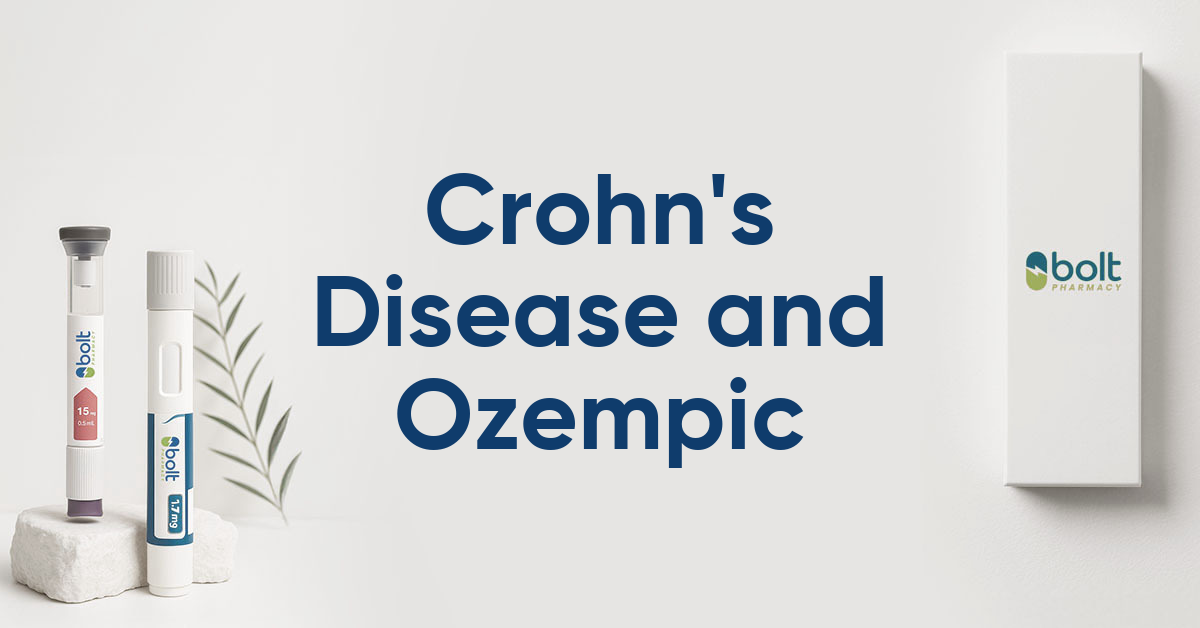Ozempic (semaglutide) is a GLP-1 receptor agonist licensed in the UK for type 2 diabetes management, but its use in patients with Crohn's disease raises important safety considerations. Whilst there is no absolute contraindication, the medication's gastrointestinal effects—including delayed gastric emptying and common side effects such as nausea and diarrhoea—may complicate Crohn's disease management. This article examines the evidence, potential risks, and alternative options for individuals with inflammatory bowel disease considering Ozempic, emphasising the importance of individualised assessment and multidisciplinary care involving both gastroenterology and diabetes specialists.
Summary: Ozempic is not specifically contraindicated in Crohn's disease, but requires careful individualised assessment due to its gastrointestinal effects and limited clinical evidence in IBD populations.
- Ozempic (semaglutide) is a GLP-1 receptor agonist licensed in the UK for type 2 diabetes, administered as a once-weekly subcutaneous injection.
- The medication slows gastric emptying and commonly causes nausea, vomiting, diarrhoea, and abdominal pain, which may mimic or worsen Crohn's disease symptoms.
- Clinical trials have largely excluded patients with significant gastrointestinal disorders, resulting in limited evidence for safety in Crohn's disease populations.
- Particular caution is needed in patients with stricturing disease, bowel obstruction history, or active flares, where delayed gut motility could increase obstruction risk.
- Decisions should be made case-by-case with close collaboration between gastroenterology and prescribing teams, with clear monitoring plans established.
- Alternative diabetes treatments (metformin, SGLT2 inhibitors, DPP-4 inhibitors) and structured dietary/behavioural interventions may be more appropriate for some patients.
Table of Contents
What Is Ozempic and How Does It Work?
Ozempic (semaglutide) is a prescription medication licensed in the UK for the treatment of type 2 diabetes mellitus. It belongs to a class of drugs called glucagon-like peptide-1 (GLP-1) receptor agonists, which work by mimicking the action of a naturally occurring hormone that regulates blood sugar levels and appetite.
The medication is administered as a once-weekly subcutaneous injection and functions through several mechanisms. Primarily, semaglutide stimulates insulin secretion from the pancreas when blood glucose levels are elevated, whilst simultaneously suppressing the release of glucagon, a hormone that raises blood sugar. Additionally, it slows gastric emptying—the rate at which food leaves the stomach—which helps to reduce post-meal blood glucose spikes and promotes a feeling of fullness.
Ozempic is initiated at 0.25 mg once weekly for 4 weeks, then increased to 0.5 mg weekly, with further dose increases to 1 mg or 2 mg if needed for glycaemic control. This gradual titration helps minimise gastrointestinal side effects.
Whilst Ozempic has demonstrated weight loss effects, it is licensed specifically for diabetes management in the UK. A higher-dose formulation called Wegovy (also semaglutide) is specifically licensed for obesity treatment under specific NICE criteria. The NHS currently advises against prescribing Ozempic off-label for weight loss due to ongoing supply constraints affecting patients with diabetes.
In clinical trials (SUSTAIN-6), Ozempic has shown benefits for glycaemic control and cardiovascular risk reduction in type 2 diabetes patients. However, important safety considerations include:
-
Risk of hypoglycaemia when used with insulin or sulfonylureas (dose reduction of these medications may be needed)
-
Not recommended in severe gastrointestinal disease, including severe gastroparesis
-
Risk of diabetic retinopathy complications, particularly in patients with pre-existing retinopathy
-
Pancreatitis risk requiring immediate discontinuation if suspected
-
Not recommended during pregnancy or breastfeeding

Can You Take Ozempic If You Have Crohn's Disease?
The question of whether Ozempic is safe for individuals with Crohn's disease is complex and requires individualised medical assessment. Currently, there is no official contraindication listed in the Summary of Product Characteristics (SmPC) that specifically prohibits the use of semaglutide in patients with inflammatory bowel disease (IBD), including Crohn's disease. However, the SmPC does state that semaglutide is not recommended in severe gastrointestinal disease (such as severe gastroparesis), which may be relevant to some Crohn's disease presentations.
Crohn's disease is a chronic inflammatory condition that can affect any part of the gastrointestinal tract, causing symptoms such as abdominal pain, diarrhoea, weight loss, and fatigue. The disease course is characterised by periods of remission and flare-ups, and management typically involves immunosuppressive medications, biologics, and careful monitoring of nutritional status. Given that Ozempic significantly affects gastrointestinal function—particularly by slowing gastric emptying—there are theoretical concerns about how it might interact with the underlying pathophysiology of Crohn's disease.
Clinical evidence specifically examining Ozempic use in Crohn's disease patients is limited. Most clinical trials of GLP-1 receptor agonists have excluded individuals with significant gastrointestinal disorders, meaning real-world data is sparse. Particular caution is warranted in patients with stricturing disease or a history of bowel obstruction, as the medication's effects on gut motility could theoretically increase obstruction risk. Initiation during an active flare is generally not advisable without specialist gastroenterology input.
The decision to prescribe Ozempic to someone with Crohn's disease must be made on a case-by-case basis, taking into account disease activity, current symptoms, medication regimen, and the presence of complications such as strictures or fistulas. Close collaboration between the prescribing physician (often an endocrinologist or GP) and the patient's gastroenterology team is essential.
Potential Risks and Gastrointestinal Side Effects
Ozempic is associated with a high incidence of gastrointestinal side effects, which are the most commonly reported adverse reactions. According to the SmPC, the following symptoms are frequently observed:
-
Nausea (reported in 15–20% of patients)
-
Vomiting
-
Diarrhoea
-
Constipation
-
Abdominal pain and discomfort
-
Bloating and flatulence
These effects typically occur during the initial weeks of treatment or following dose escalation, and often diminish over time as the body adjusts to the medication. However, for individuals with Crohn's disease, these side effects may be particularly problematic, as they can mimic or exacerbate symptoms of an IBD flare-up, making it difficult to distinguish between medication side effects and disease activity.
There are additional concerns specific to the Crohn's population. The delayed gastric emptying caused by semaglutide could theoretically worsen symptoms in patients with upper gastrointestinal Crohn's involvement or those with strictures, potentially increasing the risk of obstruction or ileus. Furthermore, persistent diarrhoea may lead to dehydration and electrolyte imbalances, which can be especially concerning for Crohn's patients who may already have compromised nutritional status and could potentially lead to acute kidney injury.
Other important safety considerations include:
-
Pancreatitis: If suspected (severe, persistent abdominal pain, sometimes with vomiting), stop Ozempic immediately and seek urgent medical attention via your GP, NHS 111, or A&E.
-
Hypoglycaemia: Risk increases when used with insulin or sulfonylureas; dose adjustments of these medications may be needed.
-
Gallbladder disease: Including gallstones and cholecystitis.
-
Diabetic retinopathy: Particularly in patients with pre-existing retinopathy on insulin therapy.
Patients should be advised to contact their GP or IBD specialist promptly if they experience severe abdominal pain, persistent vomiting, bloody stools, or signs of dehydration whilst taking Ozempic. For severe symptoms, contact NHS 111 or attend A&E. Any suspected adverse reactions should be reported via the MHRA Yellow Card Scheme (yellowcard.mhra.gov.uk).
Alternative Weight Management Options for Crohn's Disease
For individuals with Crohn's disease who require weight management—whether for obesity, type 2 diabetes, or metabolic health—several alternative approaches may be more appropriate than GLP-1 receptor agonists, depending on individual circumstances.
Dietary modification remains a cornerstone of management, though it requires careful planning in Crohn's disease. Working with a registered dietitian experienced in IBD is invaluable, as they can develop personalised nutrition plans that promote weight loss whilst ensuring adequate nutrient intake and avoiding trigger foods. Low-residue diets may be necessary during active disease, whilst balanced, whole-food approaches can support weight management during remission.
Physical activity is beneficial for both weight control and overall wellbeing in Crohn's disease. NICE guidance emphasises the importance of regular exercise for chronic disease management. Patients should be encouraged to engage in activities appropriate to their fitness level and disease state, with modifications during flare-ups.
For diabetes management specifically, alternative medications with different side effect profiles may be considered. Metformin remains first-line treatment for type 2 diabetes, though it can cause diarrhoea in some patients. SGLT2 inhibitors (such as dapagliflozin or empagliflozin) offer cardiovascular and renal benefits with different side effects (genital infections, risk of euglycaemic diabetic ketoacidosis). DPP-4 inhibitors (such as sitagliptin) are generally well-tolerated and may be suitable alternatives.
It's worth noting that orlistat, sometimes used for weight management, is contraindicated in chronic malabsorption conditions and is often unsuitable for patients with Crohn's disease.
For those meeting specific criteria, Wegovy (semaglutide) may be prescribed for obesity under NICE guidance (TA875), which requires a BMI of at least 35 kg/m² (or 30 kg/m² with weight-related comorbidities), specialist weight management service oversight, and time-limited use.
Behavioural interventions, including cognitive behavioural therapy (CBT) for eating behaviours and structured weight management programmes, can provide sustainable results. The NHS offers various weight management services, and referral to specialist obesity services may be appropriate for some patients.
Speaking to Your Doctor About Ozempic and IBD
If you have Crohn's disease and are considering Ozempic—whether for diabetes management or weight loss—open communication with your healthcare team is essential. Preparing for this conversation can help ensure all relevant factors are considered in the decision-making process.
Before your appointment, compile a comprehensive summary of your Crohn's disease history, including:
-
Current disease activity and recent flare-ups
-
Location and extent of disease involvement
-
Presence of complications (strictures, fistulas, previous surgeries)
-
Current medications and how well controlled your symptoms are
-
Your nutritional status and any history of malabsorption
Be prepared to discuss your specific goals—whether you're seeking better diabetes control, weight loss, or both—and any previous experiences with medications affecting your digestive system. It's important to mention all gastrointestinal symptoms you currently experience, as this baseline will be crucial for monitoring any changes after starting Ozempic.
Questions to ask your doctor might include:
-
Given my Crohn's disease characteristics, what are the specific risks of Ozempic for me?
-
How will we distinguish between medication side effects and an IBD flare?
-
What monitoring plan will be in place, including for retinopathy if I have diabetes?
-
If I'm taking insulin or sulfonylureas, how should I adjust these to prevent hypoglycaemia?
-
Are there alternative medications that might be safer for my situation?
-
Should my gastroenterologist be involved in this decision?
If you're of childbearing potential, discuss contraception, as semaglutide should be discontinued at least 2 months before a planned pregnancy and is not recommended during breastfeeding.
Establish a clear plan for monitoring and what symptoms should prompt immediate contact with your medical team. For severe persistent abdominal pain (especially with vomiting), contact your GP urgently, call NHS 111, or go to A&E. For worsening IBD symptoms, contact your IBD team or GP on the same day.
Your GP or endocrinologist should ideally liaise with your IBD specialist before prescribing Ozempic, ensuring coordinated care. Remember that you have the right to seek a second opinion if you're uncertain about the recommended approach, and that shared decision-making—weighing the potential benefits against the risks specific to your situation—is the foundation of good medical care.
Scientific References
- Ozempic 0.5 mg solution for injection in pre-filled pen - Summary of Product Characteristics (SmPC).
- Ozempic - European Public Assessment Report (EPAR).
- Semaglutide and Cardiovascular Outcomes in Patients with Type 2 Diabetes (SUSTAIN-6).
- GLP-1 medicines for weight loss and diabetes: what you need to know.
Frequently Asked Questions
Is Ozempic safe to use if I have Crohn's disease?
Ozempic is not specifically contraindicated in Crohn's disease, but requires careful individualised assessment. The medication's gastrointestinal effects may complicate IBD management, particularly in patients with strictures or active disease, so decisions should involve both your gastroenterology and prescribing teams.
What are the main gastrointestinal side effects of Ozempic?
The most common gastrointestinal side effects include nausea (15–20% of patients), vomiting, diarrhoea, constipation, abdominal pain, and bloating. These typically occur during initial treatment or dose escalation and may diminish over time, but can be particularly problematic for Crohn's disease patients.
What alternatives to Ozempic exist for diabetes management in Crohn's disease?
Alternative diabetes medications include metformin (first-line treatment), SGLT2 inhibitors (such as dapagliflozin), and DPP-4 inhibitors (such as sitagliptin), each with different side effect profiles. Dietary modification with specialist dietitian support and structured physical activity programmes are also important components of management.
The health-related content published on this site is based on credible scientific sources and is periodically reviewed to ensure accuracy and relevance. Although we aim to reflect the most current medical knowledge, the material is meant for general education and awareness only.
The information on this site is not a substitute for professional medical advice. For any health concerns, please speak with a qualified medical professional. By using this information, you acknowledge responsibility for any decisions made and understand we are not liable for any consequences that may result.
Heading 1
Heading 2
Heading 3
Heading 4
Heading 5
Heading 6
Lorem ipsum dolor sit amet, consectetur adipiscing elit, sed do eiusmod tempor incididunt ut labore et dolore magna aliqua. Ut enim ad minim veniam, quis nostrud exercitation ullamco laboris nisi ut aliquip ex ea commodo consequat. Duis aute irure dolor in reprehenderit in voluptate velit esse cillum dolore eu fugiat nulla pariatur.
Block quote
Ordered list
- Item 1
- Item 2
- Item 3
Unordered list
- Item A
- Item B
- Item C
Bold text
Emphasis
Superscript
Subscript












